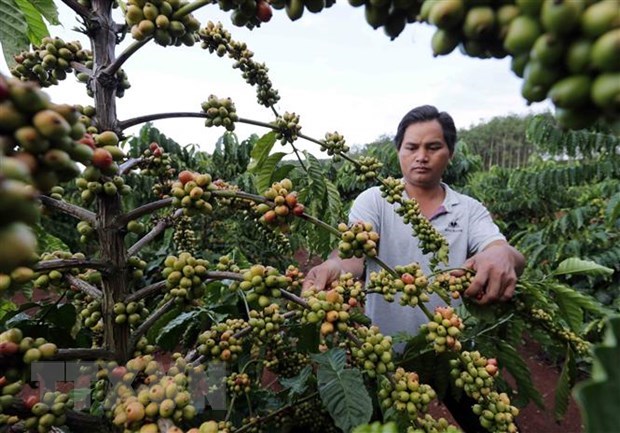Experts talk ways to add value to Vietnamese coffee
Vietnam’s coffee sector needs to have strategies to improve material quality and step up intensive processing to increase export value and incomes for farmers as well as develop Vietnamese coffee brand, said experts at the Vietnam Coffee Week in HCM City on December 4.
 Illustrative image (Photo: VNA)
Illustrative image (Photo: VNA) HCM City (VNA) – Vietnam’s coffee sector needs to have strategies
to improve material quality and step up intensive processing to increase export
value and incomes for farmers as well as develop Vietnamese coffee brand, said
experts at the Vietnam Coffee Week in HCM City on December 4.
Vietnam has set itself a target of increasing the ratio of processed coffee from the current 10 percent to 30-40 percent by 2030 to add value.
Dr Nguyen Do Anh Tuan, director general of the Ministry of Agriculture and Rural Development’s international cooperation department, said Vietnam is the world’s second largest coffee exporter and tops in robusta production and export, with about 1.5 million tonnes of coffee exported each year, fetching 3.5 billion USD.
But the exports remain in the form of unprocessed beans with little value addition, he said.
To improve this situation and develop the industry in a sustainable manner, the sector plans comprehensive measures such as expanding processing, building brands for its products and strengthening linkages in the value chain, he said.
Luong Van Tu, chairman of the Vietnam Coffee and Cocoa Association, said coffee exports in the 2018/19 crop were 1.7 million tonnes worth 3 billion USD, a year-on-year decrease of 2.9 percent in volume and 14.4 percent in value.
Exports of roasted, soluble and mixed coffee accounted for 8 percent, he said.
“More and more local and foreign firms are investing in roasted and ground coffee and soluble coffee,” he said.
There are over 620 roasted coffee factories with a capacity of over 73,000 tonnes a year, he said.
Soluble coffee factories have a capacity of over 47,000 tonnes a year, with some new ones being set up by companies like TATA Group (India), Tin Nghia Corp and Intimex, he said.
Foreign investors are increasingly investing in processing to take advantage of the plentiful availability of premium coffee, a large domestic market with a population of 97 million, and tax breaks through 40 free trade agreements the country has signed.
“Processed coffee enjoys preferential tariffs of from 0 to 5 percent when exported to markets that have FTAs with Vietnam,” he said.
Coffee consumption has increased significantly in the domestic market though per capita consumption remains low compared to the world’s average, he added.
Do Ha Nam, chairman and general director of Intimex Group, said: “Local and foreign firms continue to invest in soluble coffee plants and coffee shop chains.”
Local coffee shops and chains continue to gain its popularity and expand, he said.
“Domestic coffee consumption is expected to increase by 5-10 percent a year. Exports of instant coffee will continue to grow rapidly.”
Nam said around 200,000 metric tonnes of green bean robusta and arabica are sold in the domestic market, mostly to soluble coffee plants for processing.
Nam said Vietnam’s robusta production in the 2019-20 crop is expected to be unchanged or increase by 5 percent.
The harvest would be delayed due to the weather and lack of labour and high labour cost, but the coffee would be of good quality, he added./.
Vietnam has set itself a target of increasing the ratio of processed coffee from the current 10 percent to 30-40 percent by 2030 to add value.
Dr Nguyen Do Anh Tuan, director general of the Ministry of Agriculture and Rural Development’s international cooperation department, said Vietnam is the world’s second largest coffee exporter and tops in robusta production and export, with about 1.5 million tonnes of coffee exported each year, fetching 3.5 billion USD.
But the exports remain in the form of unprocessed beans with little value addition, he said.
To improve this situation and develop the industry in a sustainable manner, the sector plans comprehensive measures such as expanding processing, building brands for its products and strengthening linkages in the value chain, he said.
Luong Van Tu, chairman of the Vietnam Coffee and Cocoa Association, said coffee exports in the 2018/19 crop were 1.7 million tonnes worth 3 billion USD, a year-on-year decrease of 2.9 percent in volume and 14.4 percent in value.
Exports of roasted, soluble and mixed coffee accounted for 8 percent, he said.
“More and more local and foreign firms are investing in roasted and ground coffee and soluble coffee,” he said.
There are over 620 roasted coffee factories with a capacity of over 73,000 tonnes a year, he said.
Soluble coffee factories have a capacity of over 47,000 tonnes a year, with some new ones being set up by companies like TATA Group (India), Tin Nghia Corp and Intimex, he said.
Foreign investors are increasingly investing in processing to take advantage of the plentiful availability of premium coffee, a large domestic market with a population of 97 million, and tax breaks through 40 free trade agreements the country has signed.
“Processed coffee enjoys preferential tariffs of from 0 to 5 percent when exported to markets that have FTAs with Vietnam,” he said.
Coffee consumption has increased significantly in the domestic market though per capita consumption remains low compared to the world’s average, he added.
Do Ha Nam, chairman and general director of Intimex Group, said: “Local and foreign firms continue to invest in soluble coffee plants and coffee shop chains.”
Local coffee shops and chains continue to gain its popularity and expand, he said.
“Domestic coffee consumption is expected to increase by 5-10 percent a year. Exports of instant coffee will continue to grow rapidly.”
Nam said around 200,000 metric tonnes of green bean robusta and arabica are sold in the domestic market, mostly to soluble coffee plants for processing.
Nam said Vietnam’s robusta production in the 2019-20 crop is expected to be unchanged or increase by 5 percent.
The harvest would be delayed due to the weather and lack of labour and high labour cost, but the coffee would be of good quality, he added./.











